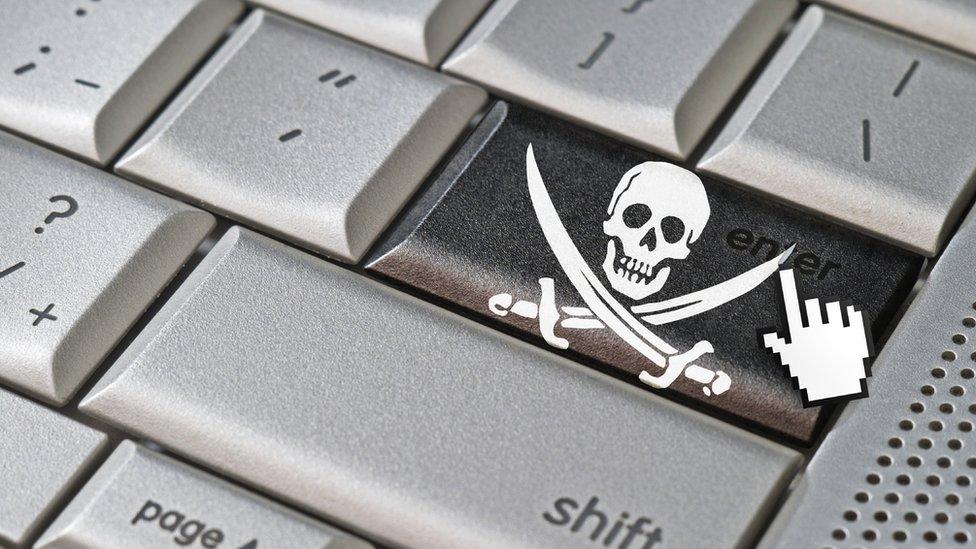US halts internet 'six strikes' anti-piracy scheme
- Published

The nature of piracy has changed in recent years
A controversial programme that could have seen persistent content-pirates have their internet access cut off, has been stopped in the US.
The Copyright Alert System (Cas), notified internet subscribers whose accounts had been used to download copyrighted content for free.
Copyright holders hailed the scheme a success, despite its closure.
But critics said there was no evidence to show that the system had brought down piracy levels.
Content bodies, such as the RIAA (Recording Industry Association of America ) and the MPAA (Motion Picture Association of America) have long lobbied for greater punishments for content-stealing and finally agreed the "six strikes" plan with several of the US's large internet service providers in 2013.
Under the scheme, millions of notices were sent to consumers believed to have downloaded content without paying for it.
Throttled
The system was complex - the first two notices were purely educational, the third and fourth required a response from the consumer and on the fifth and sixth notices, consumers might face punishments - such as having their internet speeds throttled. This was left up to the internet service provider, which could also terminate the account if it wanted to.
The Center for Copyright Information, which administered the system, explained that it had now been dropped.
"After four years of extensive consumer education and engagement, the Copyright Alert System will conclude its work. The programme demonstrated that real progress is possible when content creators, internet innovators and consumer advocates come together in a collaborative and consensus-driven process."
Little information was available about how successful the scheme had been although it appears that no action was taken against those who received six strikes.
According to the Center for Copyright Information, 1.3 million alerts were sent out in the programme's first 10 months and fewer than than 3% of those were sixth strikes.
MPAA lawyer Steven Fabrizio said in a statement: "While CAS demonstrates that a significant number of users who received alerts stopped engaging in piracy, fulfilling CAS' educational goal, a persistent group of hard-core, repeat infringers are unlikely to change their behaviour.
'Less effective'
Ernesto van der Sar, editor of piracy news website TorrentFreak told the BBC, copyright holders and ISPs have been working on an improved version of the Cas for more than a year but had failed to reach agreement.
"In recent years a lot of copyright infringement has moved away from BitTorrent networks to streaming and direct downloading, which isn't covered by the programme. This has made the warning system less effective on a grander scale," he said.
In May 2015, the Internet Security Task Force, which represents a range of film studios, criticised the system as ineffective.
It used the example of the film Expendables 3 which it claimed had been illegally viewed "more than 60 million times".
Mr van der Sar added: "The news doesn't reflect well on the Get it Right programme, which is the UK equivalent of the Copyright Alerts System without the mitigation measures."
UK ISPs have just begun sending out warning emails to customers identified as having their connection used for illegally downloading content. The notifications advise consumers about legal alternatives, rather than threaten any form of punishment.
A spokesman for the Get it Right campaign said its programme was having a "positive impact" in educating consumers about the legal options for enjoying content.
"Almost a quarter of the population have now been exposed to the campaign in some way and amongst this group, early results from the campaign show a drop in piracy," he said.
- Published1 April 2016

- Published19 February 2016
